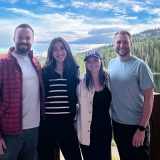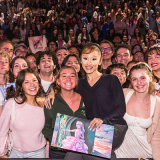With New Tools, Documentary Filmmakers Are Achieving New Things
October 26, 2015
Though still relatively new, our MFA in Documentary Filmmaking is making waves, and catching the interest of many people looking to tell powerful stories. Recently, Professors Sally Rubin and Jeff Swimmer gave a masterclass to talk about some of the major challenges and issues facing today’s documentary filmmakers, including changes in technology, broadcast, distribution outlets, and how these affect the films people make.
One of the key takeaways they touched on was the changes in technology, and how, with a new appetite for shorter, more innovative films in our culture, the nonfiction world is expanding and changing.
“This new, ‘snackable’ content will insure that our collective hunger for non-fiction content is never quite satisfied,” Swimmer said.
“The documentary field has always been affected by changes in technology, and we’re seeing this now,” said Rubin. “With the accessibility of smaller, cheaper, and lighter cameras with more powerful lenses than ever, students are able to shoot films that look cinematic and professional.”
According to Rubin, some of the newer cameras don’t have sync sound built into them, so students are often recording to a secondary sound source. The result is films that have a lot of voice over, heavy on the visual filmmaking and poetry.
“They are sometimes less driven by traditional verite scenes. The result is neither good nor bad- it’s simply something different and new,” Rubin said.
In addition to new cameras, there are also new types of interactive online storytelling have taken hold in the nonfiction field. One example is accessible online in the form of Mozilla’s Popcorn tool, which allows storytellers to insert multiple elements into what used to be a traditional, two-dimensional narrative space.
“For instance, if I upload a short piece about immigration, I can add to the film, at various points, pop-outs that offer statistics on immigration, virtual and interactive maps showing locations, and more,” said Rubin.
At the end of the day, though, both Rubin and Swimmer hope students are inspired to pick up a camera and try their hand at documentary filmmaking.
“We always welcome folks into our courses, and are amazed at the talent pool that lies here in our student body at Dodge,” said Rubin. “Our documentary students doing some beautiful work, and we hope that the audience is inspired by their films.”
For more information about our MFA in Documentary Filmmaking, please check its page on our website.


